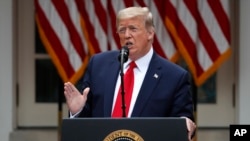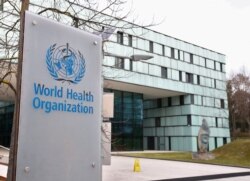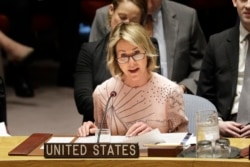U.S. President Donald Trump says China’s actions on Hong Kong are “plain violations of its treaty obligations” in remarks Friday that strongly criticized Beijing on a host of issues including its trade practices, handling of the coronavirus pandemic and dealings with the World Health Organization.
Trump said Hong Kong is no longer sufficiently autonomous to merit special treatment from the United States and said his administration will begin a process to eliminate policy exemptions giving the city preferential treatment.
During remarks Friday in the White House Rose Garden, Trump said the State Department would be revising its travel advisory for Hong Kong to reflect “increased danger of surveillance.”
This week, China's National People's Congress approved imposing a national security law on Hong Kong despite previous commitments by Beijing to maintain “two systems” — one for the mainland and one for Hong Kong.
Trump called this a tragedy for the people of Hong Kong, China and the world.
On the issue of the deadly coronavirus pandemic, Trump called China’s actions “malfeasance,” saying Chinese officials ignored their reporting obligations on the virus to the World Health Organization and pressured the organization to mislead the world.
Trump said the United States is “terminating” its relationship with the WHO, adding that China has “total control” over the organization. He noted that the United States contributes about $450 million to the world body, while China provides about $40 million.
The president said the United States would redirect the funding to “other worldwide and deserving urgent global public health needs."
“The world needs answers from China on the virus. We must have transparency,” the U.S. president told reporters.
Trump also said he would suspend the U.S. entry of certain Chinese nationals who are considered security risks.
White House later said in a statement Friday that it would be suspending entry of Chinese graduate students and researchers who it accuses of illegally acquiring intellectual property from the United States.
The order said the students are “detrimental to the interests of the United States, and that their entry should be subject to certain restrictions, limitations, and exceptions.”
Trump also criticized China’s trade policies but did not mention any action that would undermine the first phase of a trade deal that Washington and Beijing signed this year.
“For decades they have ripped off the United States,”the president said,noting that he is instructing a working group to study differing practices of Chinese companies that are listed on U.S. stock market indexes.
“President Trump has today declared unequivocally that China is an enemy of the United States — an enemy he plans to push back against using not only strong words but clearly tough actions,” said Harry Kazianis, a senior director at the Center for the National Interest.
“A dangerous superpower showdown is brewing that could set the direction of U.S. foreign policy for the next decade or more,” he added.
Earlier Friday, the United States and Britain raised Hong Kong at the U.N. Security Council, noting the issue warrants urgent international concern.
“The United States is resolute, and calls upon all U.N. members states to join us in demanding that the PRC immediately reverse course and honor its international legal commitments to this institution and to the Hong Kong people,” U.S. Ambassador to the U.N. Kelly Craft said in a statement following an informal closed-door session.
The U.S. and Britain had sought a public meeting on the matter, but China blocked the move, so instead, Hong Kong was raised in a private, virtual session, as the council has suspended physical meetings due to COVID-19.
China’s U.N. Mission sought to downplay the meeting in a series of tweets, saying that the issue of Hong Kong is “widely recognized” to have nothing to do with the Security Council’s mandate, and that it would “continue to oppose any form of interference in China’s internal affairs.”







